
Inhaltsverzeichnis
- Finding 1: Digital transformation is largely a product function
- Finding 2: Product leaders have room for improvement in digital transformation
- Finding 3: Leadership sees digital transformation efforts as more successful than individual contributors do
- Finding 4: Product professionals feel responsible for digital transformation, with slight variations globally
In a rush?
Download the PDF for later
The link between digital transformation and product management
As companies work to accelerate their digital transformations, an early challenge is determining who will own these efforts. Product teams offer a blend of technical and business skills, making them well-equipped change agents who can utilize their cross-functional position to help the entire organization evolve. While we’ve already identified a connection between product management and digital transformation, this study reveals just how critical product professionals are in leading businesses through this next phase of change.
Here are some of the most pertinent findings:
- Digital transformation is primarily the job of product teams
- Product leaders have room for improvement in digital transformation, though certain factors contribute to heightened success
- Leadership views digital transformation efforts as more successful than individual contributors do
- Globally, product professionals feel responsible for digital transformation
To get these results, we conducted a survey of 600 professionals of all levels spanning a variety of industries, company sizes, and geographic locations. We asked who they believe is driving digital transformation at their organizations and, more importantly, how successful they view it.
Finding 1: Digital transformation is largely a product function
Successful digital transformation requires effort from the entire company, but a key first step is determining who will lead the initiative. When asked which departments are perceived to be responsible for digital transformation, 66% of respondents chose Product/R&D (note: respondents could choose multiple answers). This was more than double the next-highest response (Executive Team Only, 31%).
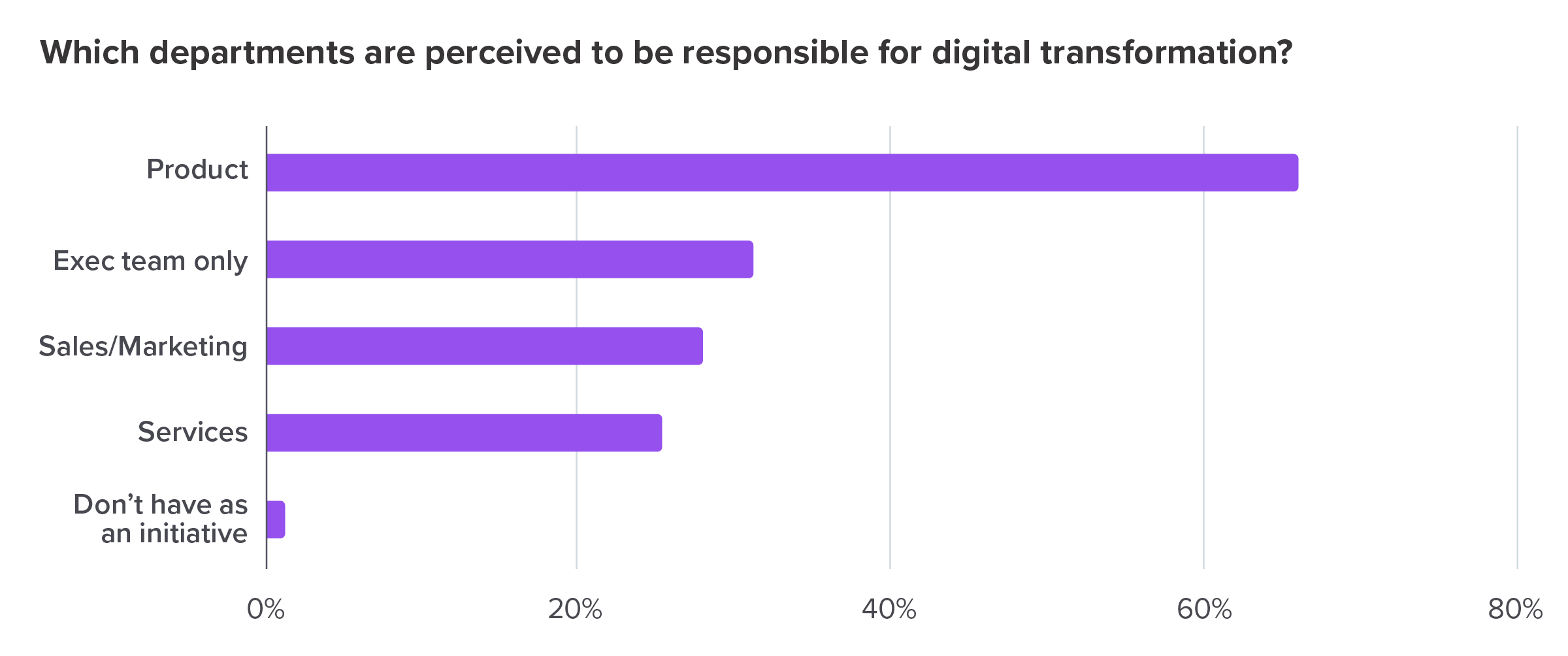
As digital transformation jumped to the top of every company’s priority list this past year, product leaders were quick to adapt and, as the data shows, take ownership of it. And for good reason: product pros’ unique combination of technical and business skills make them well suited to lead their companies through these transformations.
Things get more interesting when you dig into the data even further. Product and R&D teams are most perceived to be responsible for digital transformation at companies with less than 99 employees and those with more than 1,000 employees. One explanation for this is that small companies may have more agility to shift resources and run experiments to drive transformation through the product, whereas larger, more traditional enterprises have the most pressing need to evolve and adapt to customers’ digital demands.

Digital transformation is also more commonly spearheaded by product teams at B2B companies, with 59% of the respondents who chose Product/R&D hailing from businesses that serve other businesses (compare this with the 31% who work at B2C organizations and 34% whose companies have both B2B and B2C business models). When you examine the data by respondents’ roles, both individual contributors (74%) and leadership (65%) feel strongly about this too, with Product/R&D being the highest response for both groups.
Finding 2: Product leaders have room for improvement in digital transformation
While it’s encouraging to see that many organizations are leaning on their product teams to lead digital transformation, it’s important to examine this trend more closely. Now that digital transformation has been dropped on product’s plate, how are they handling it?
When asked how they would rate their organization’s performance in digital transformation, respondents gave a 4.3 out of 5 (where 0 is “Ineffective” and 5 is “Effective”). Not bad, right? Not quite…
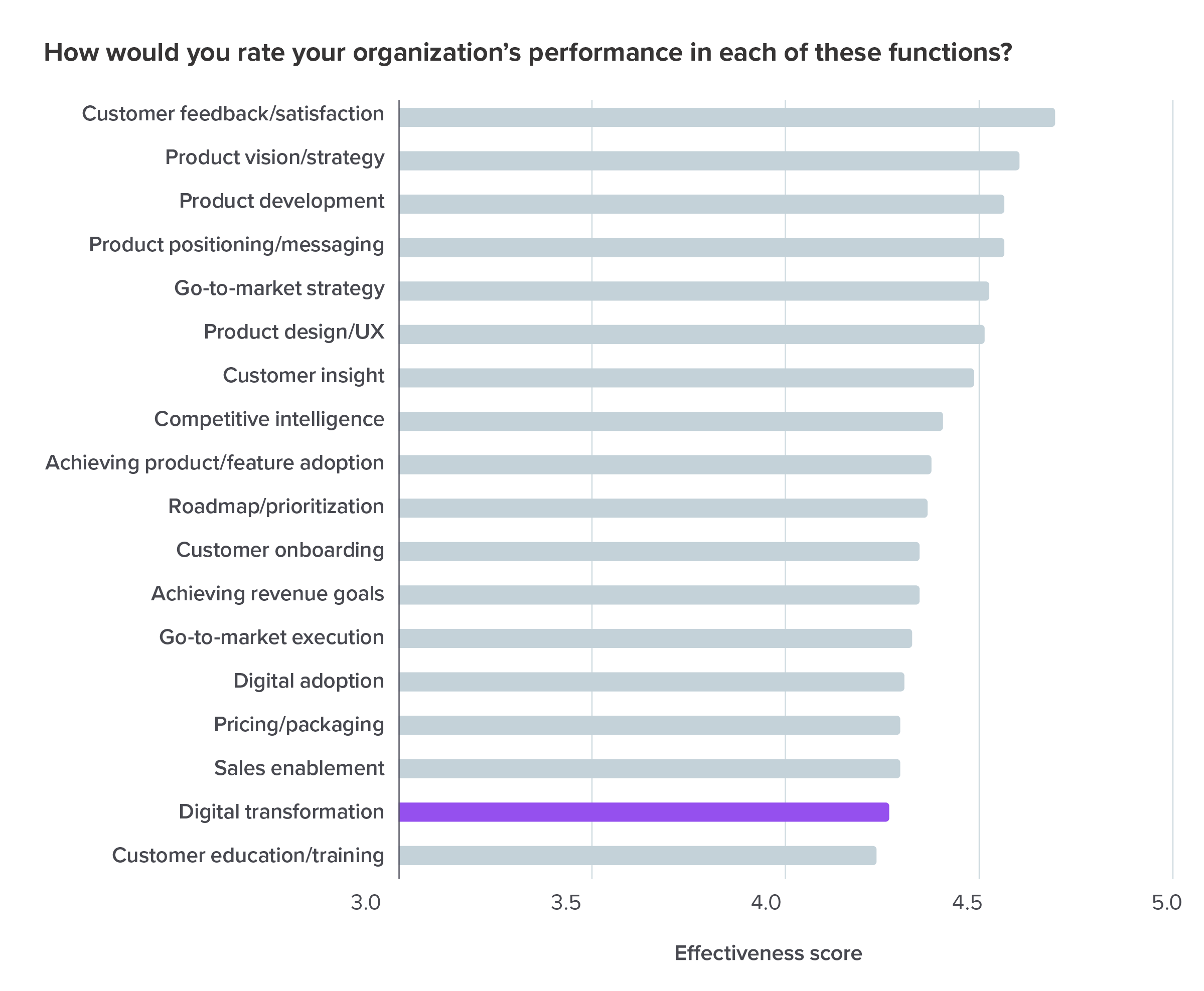
Compare this with the rest of the categories for which they rated performance, and respondents gave digital transformation the second to lowest score. It’s nice to see that no category faired lower than a 4.2 out of 5, but the data reveals that product pros have a ways to go in achieving digital transformation success.
The data does reveal some sub-groups who are outpacing others, rating their organizations’ performance in digital transformation higher than the overall answer of 4.3. For example, when you look at responses segmented by product management responsibilities, those responsible for more than one product gave a rating of 4.5, and those responsible for one or more features/capabilities rate their companies’ digital transformation efforts a 4.4 out of 5. It could be the case that the more products or features one works on, the more involved they are in digital transformation, and therefore see it as more successful.
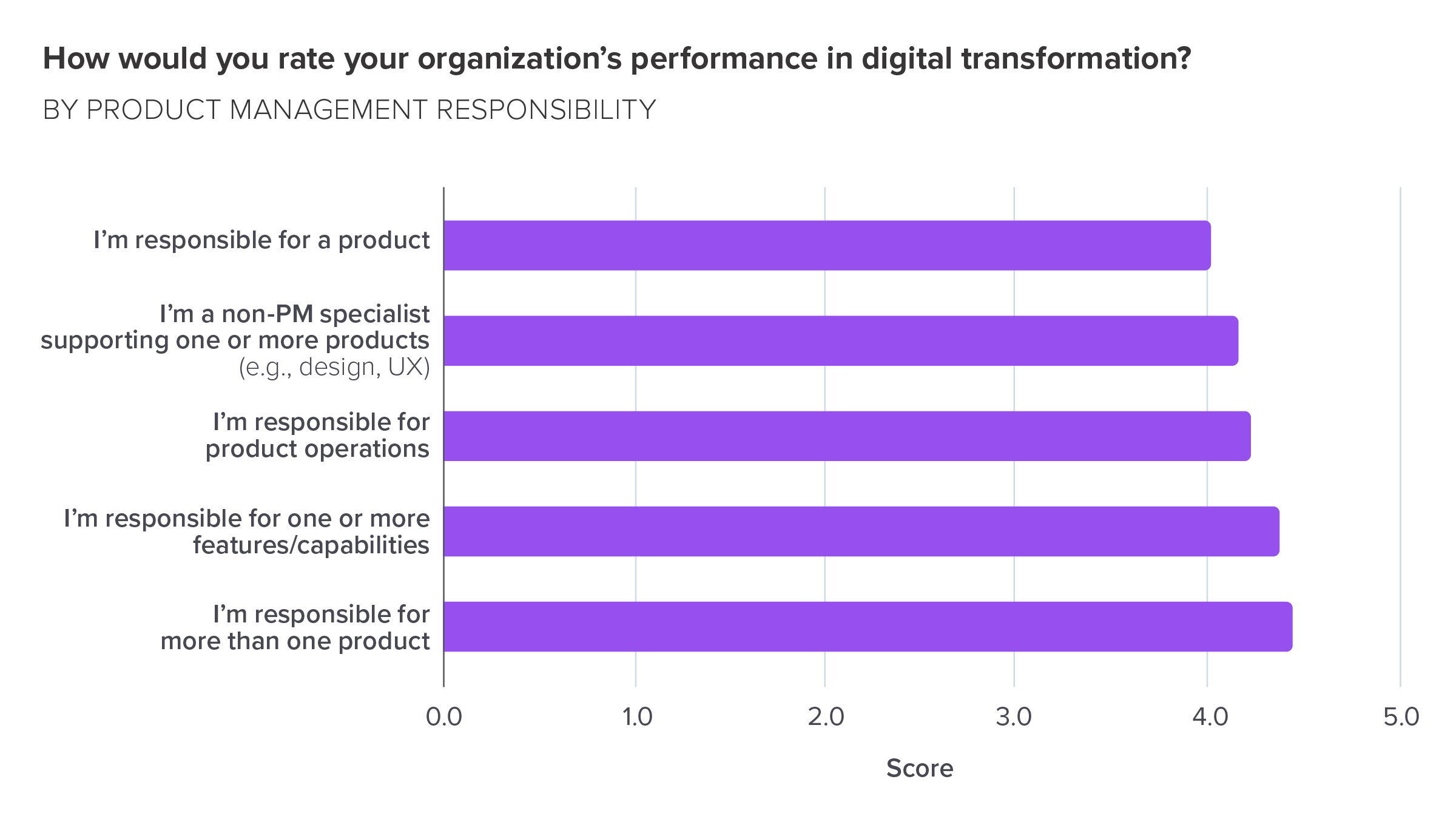
We’re also able to see if certain types of organizations correlate with better performance in digital transformation. Interestingly enough, respondents at SaaS providers gave the lowest rating (4.2) and respondents at traditional enterprises with digital offerings gave the highest (4.4).
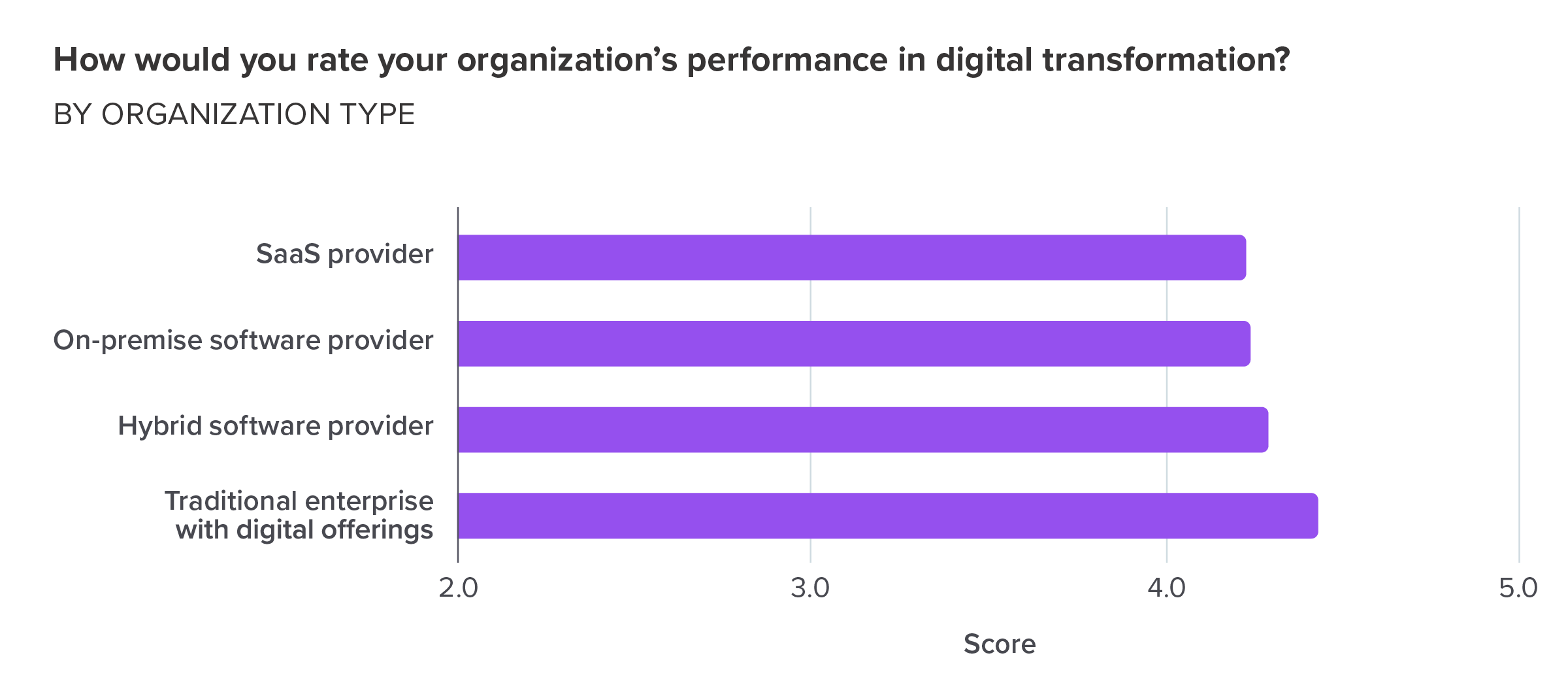
This could be due to the simple fact that larger enterprises are pursuing digital transformation more aggressively, whereas software-as-a-service providers are already digital-first in nature. Traditional enterprises also have more resources and money to put toward digital transformation, which could be a reason for their perceived success.
Finding 3: Leadership sees digital transformation efforts as more successful than individual contributors do
We saw earlier that both individual contributors and leadership felt equally strong about Product and R&D teams being responsible for digital transformation at their organizations. But, the responses divulged when it came to how effective they view these efforts.
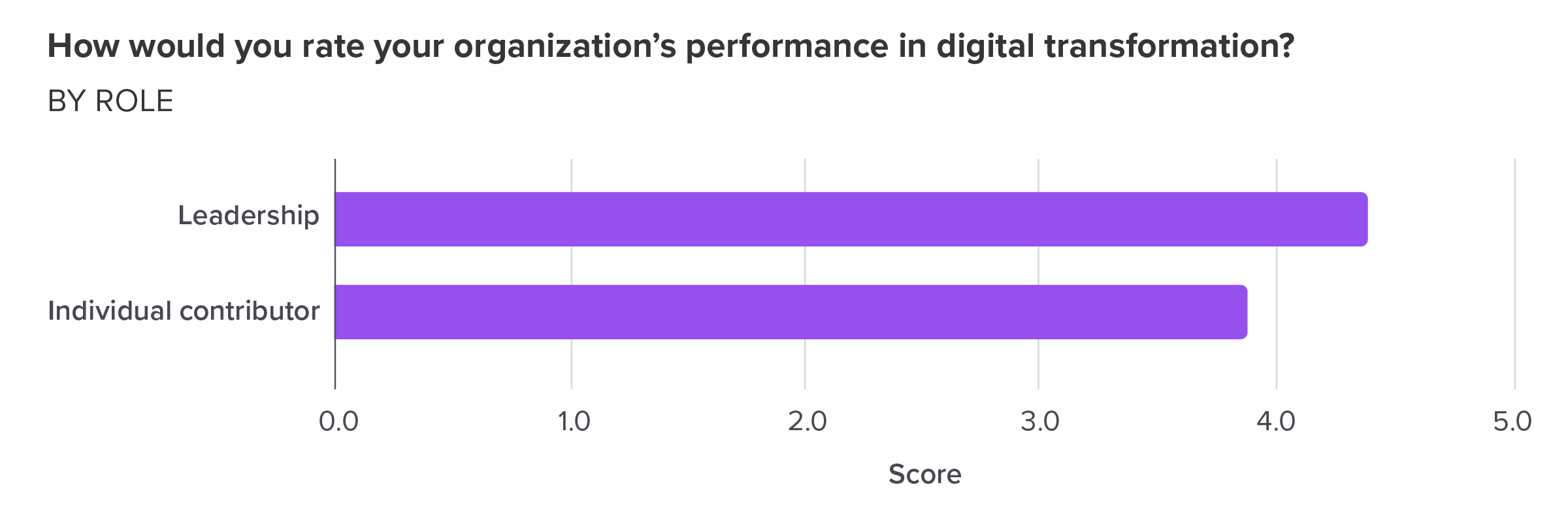
On a scale from 0 to 5 (where 0 is “Ineffective” and 5 is “Effective”), respondents in leadership roles rated their organization’s performance in digital transformation a 4.4, and ICs rated it a 3.9. This feels counterintuitive at first, as one might think that folks executing the day-to-day work related to digital transformation would view it as more successful.
As it turns out, 27% of respondents in leadership roles see themselves as responsible for digital transformation, whereas only 3% of individual contributors consider themselves responsible for these efforts. Similarly, the higher the person’s salary, the more responsible they feel for digital transformation.
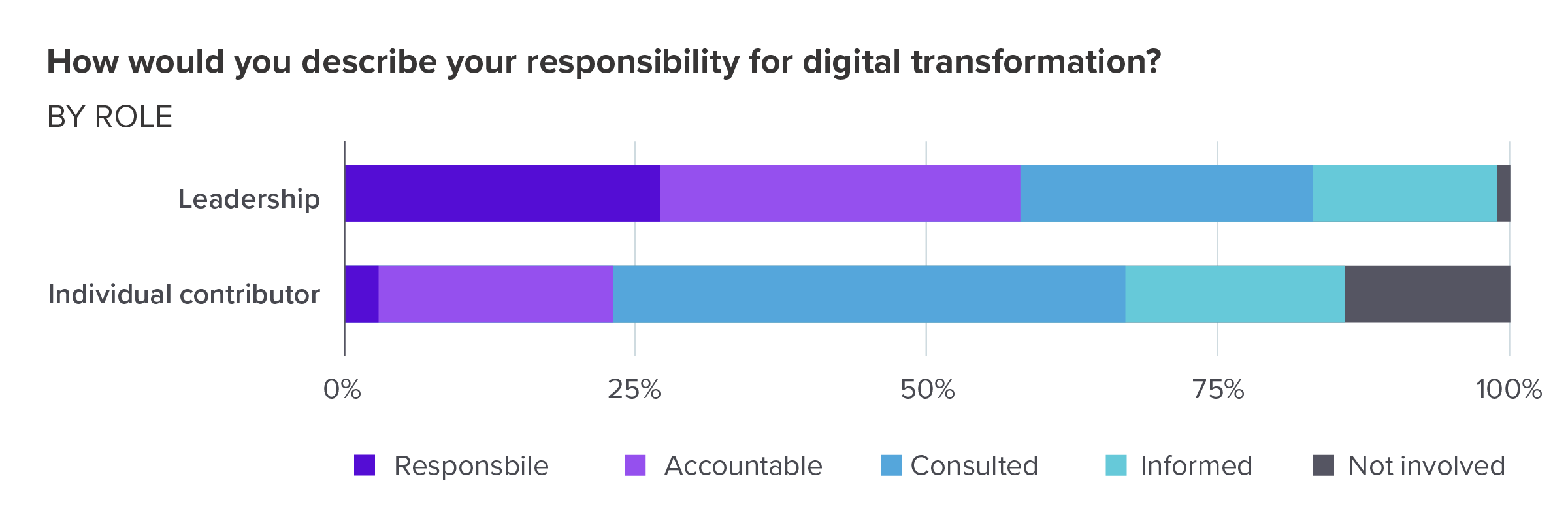
This suggests that there’s more work to be done to rally the entire organization behind digital transformation. The data sheds light on the fact that even if leadership is bought in—or goes as far to say they take responsibility for digital transformation—the challenge may be in getting the rest of the company on the same page. Regardless of if employees feel responsible for digital transformation, you would hope that they still feel confident in their organization’s pursuits.
Finding 4: Product professionals feel responsible for digital transformation, with slight variations globally
Overall, 22% of the respondents said that they feel responsible for digital transformation (with 29% feeling accountable and another 29% informed). On a global level, this feeling of responsibility is slightly stronger in the US, with European product leaders growing their confidence and conviction.
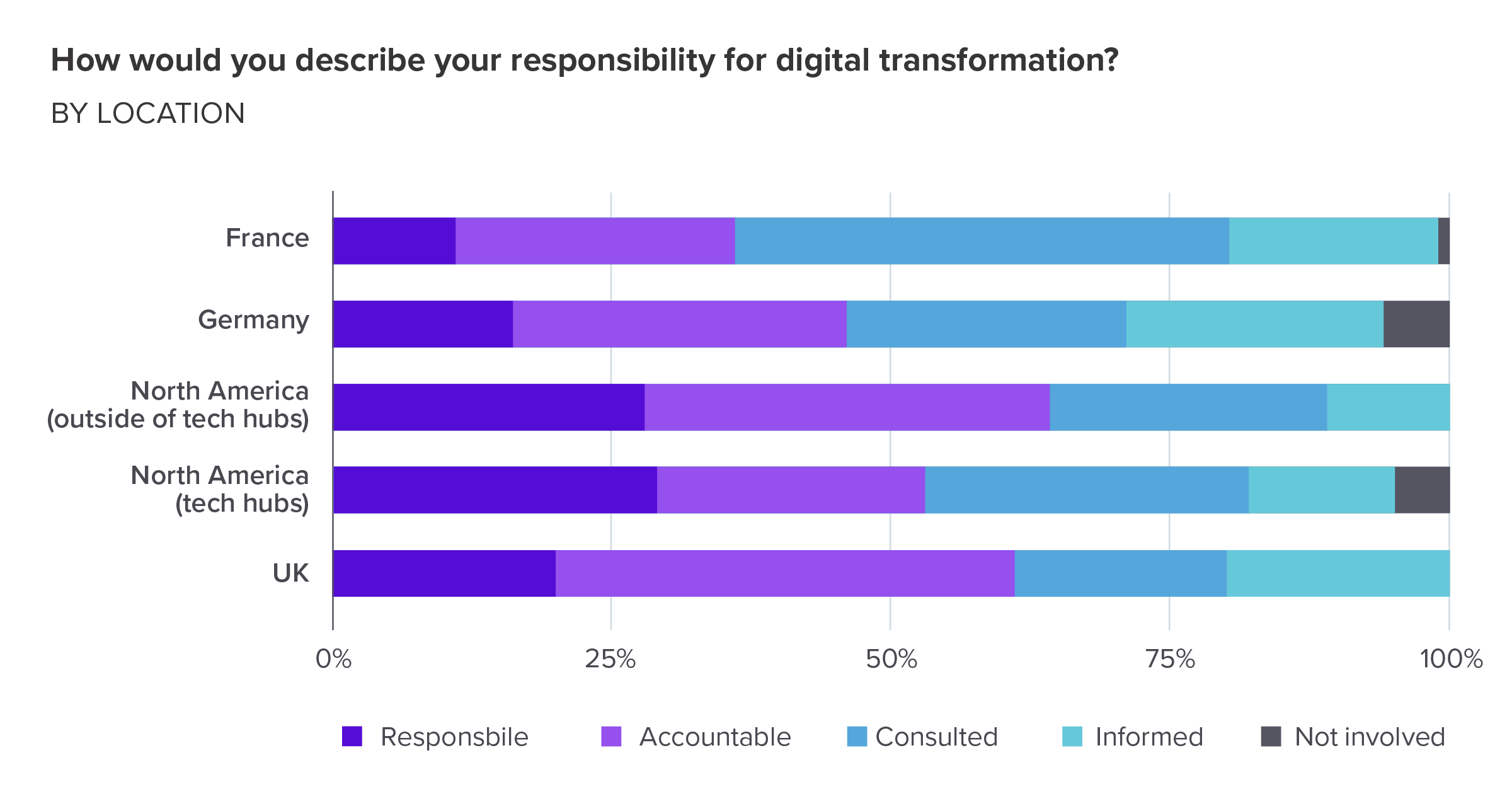
Still, all five regions were within 18% (or less) of each other for the response of feeling responsible for digital transformation. When you compare this gap with other surveys of the like, it becomes clear that product leaders around the world are relatively aligned when it comes to digital transformation.
For example, in The advance of automation, a report by The Economist Intelligence Unit about the adoption of automation technology, they asked participants the extent to which their organizations use technology to automate business processes. Of the 502 executives they surveyed from eight different countries, the gap between the country with the highest percentage of respondents answering that they make extensive use of automation (US, 61%) and the country with the lowest (Canada, 28%) was 33%—nearly double our gap of 18% between France and North American Tech Hubs.
Although it’s sometimes the case that the US adopts technological trends first and Europe follows, in the case of digital transformation, it’s anyone’s game.